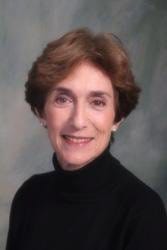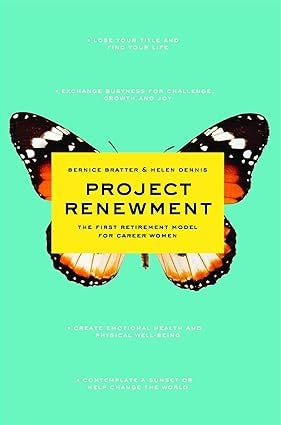In my latest podcast, syndicated columnist Helen Dennis and I discuss her program for “renewment” as opposed to retirement. Specifically aimed at “career” women in or moving towards retirement, Dennis and her co-founder Bernice Bratter have convened more than 40 groups of women working together to find fulfillment in their post-working lives.
These groups of eight to ten women meet regularly, sometimes for decades, to discuss the issues they face in their later years. While each group is autonomous, they are guided by Dennis and Bratter’s book, Project Renewment: The First Retirement Model for Career Women. It provides prompts for discussion such as:
Who am I without my business card?
What does productivity mean?
What if my partner retires first?
What if I end up on my own?
The New Retirement
Dennis explained to me that a lot about retirement has changed in recent decades. This is the first time that we have so many women with careers moving into retirement. In addition, increased longevity has changed post-working life for both men and women.
“Forty years ago, aspirations were different, life expectancy was shorter. Now with increased longevity and better health, people are asking ‘What will get me up in the morning?’ It becomes a moment of personal exploration. ‘Who do I become in the next 20 or 30 years?’”
One of the wonderful unintended consequences of the Renewment groups, Dennis says, has been the creation of communities. They have done a lot to combat the loneliness which is an epidemic in the U.S. in general and among older people in particular.
Financial Security
While all the women in the Renewment groups had careers, they are not all on the same footing financially. Women’s careers were often less consistent than men’s since they were often out out of the workforce while raising families. As a result, they may have earned less money and now have less money saved up than men.Dennis
While the groups don’t talk about the nitty gritty of money they do discuss what “financial security” means. It’s a keystone to retirement. “If you’re barely surviving and can’t meet the rent or pay for medications your not really thinking about what would be fulfilling.”
Finances also come up in discussing the cost of health care and long-term care, and who will be there for them when they need care.
Dennis comments that retirement is also less affordable than it was 40 years ago due in large part to inflation, especially in the cost of health care. Now we’re living longer and most people don’t have a defined pension plan. They are worried about running out of money.
Many participants are continuing to work to some extent for financial reasons and for purpose. Some are working but not getting paid.
Ethnic Differences
I asked Helen if she sees any ethnic differences in retirement. She did, in large part due to financial differences. “Black American workers earn less than white American workers on average. They are more likely to work for employers who don’t contribute to their retirement plans in the same was as for many white employees. As a result, they are definitely disadvantaged and have a less financially secure retirement.”
The opportunity for renewment are not necessarily available to all Americans. “Economic stress easily becomes a top priority. You’re worried that you can’t give to your grandchildren what you want to give.” But she also sees a lot of non-white retirees caring for grandchildren, which does have it’s benefits in terms of providing purpose and combating loneliness.
Recommendations
I ask all my guests for their recommendations to policy makers and individuals. In terms of policy, Helen said that with nearly 7 million Americans suffering from Alzheimer’s disease we need funding other than Medicaid to provide support to families to be able to hire caregivers.
“One out of three Americans 85 and over has Alzheimer’s disease. The 85-plus cohort is the fastest growing segment of the population. It doesn’t take a mathematical genius to see what the demands are going to be for health care, for families. Families cannot afford to pay for the home health care. It there were a way to partially fund that other than Medicaid it could make a big difference.”
For individuals in or approaching retirement, Helen recommends that “assuming your finances in order, look at retirement as an opportunity to be your best self and more fulfilled. We we have more opportunities than we have every had. We just have to open our minds and look around and be resourceful and take the initiative. Take the initiative, take the risk and see that this can be a time of opportunity.”
Check out Project Renewment here.
Topics
00:00 Introduction to Renewment
00:55 Origins of Renewment
01:55 Renewment in Practice
03:05 Challenges and Opportunities in Retirement
05:47 Gender Differences in Retirement
08:34 Financial Security in Retirement
12:06 Evolving Expectations of Retirement
23:47 Policy Recommendations for Aging Population
27:13 Final Thoughts and Recommendations



